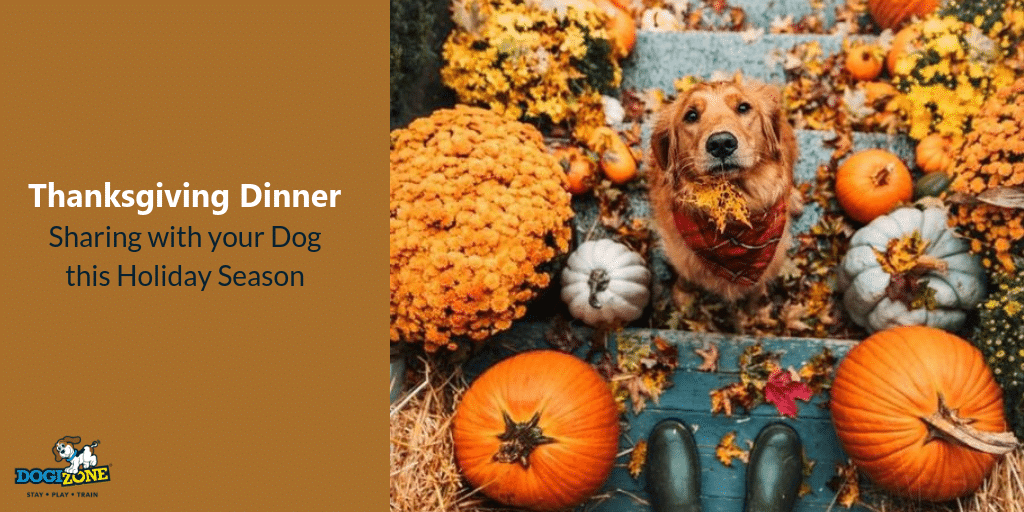Thanksgiving Dinner: Sharing with your Dog this Holiday Season
Thanksgiving Dinner – Sharing With Your Dog This Holiday Season 
The holiday season is quickly approaching and that means good company, lots of delicious food, and an increase in serious cases of puppy dog eyes. As we sit down for our Thanksgiving dinner the temptation to share with our furry friends is strong – it can be difficult to say ‘no’ to those oh so angelic faces staring down our next bite of turkey. It’s okay to share sometimes but there are always foods to avoid so that your pets stay safe as well as healthy.
When giving your pets scraps remember: everything in moderation. Upset tummies can occur simply from overeating so all treats should be kept to a minimum or at least within the bounds of what your dog normally eats on a daily basis. If you prefer to avoid people food all together in your pup’s diet consider keeping some treats handy on the big day, and make sure your guests (especially young ones!) know what your pet can and cannot eat.
We’ve broken down what foods are good, okay, and just plain bad for you below:
Good:
Foods in this category are best served plain and in their most natural state (ie. raw or very lightly processed without additives), and can also be incorporated into your dog’s every day diet.
Green beans: Both filling and low in calories, green beans are a great source of fiber, vitamins K and C, and manganese. Serve these frozen for a fun treat or mixed into your dog’s regular food.
Pumpkin: Also a great source of fiber and beta carotene. Fresh is always best, but canned is also okay so long as there are no artificial additives or pie spices included.
Sweet potatoes and/or yams: Another great source of fiber and beta carotene but also vitamins B6 and C as well as manganese. Try slicing and dehydrating these as a vegetarian alternative to rawhide or bully sticks if your dog likes chewy treats!
Carrots: Another low calorie source of fiber and beta carotene that is also good for your dog’s teeth.
Apple slices: Perfect for dogs that are more discerning to crunchy and sweet treats! Apples help keep teeth clean, breath fresh, and provide yet another boost of fiber, vitamins A and C, and protective phytonutrients.
Peanut butter: A great source of protein, heart healthy fats, vitamins B and E, and niacin. Stuff a Kong toy and keep your dog occupied for hours (and away from the dinner table!).
Yogurt: Fat free, probiotic rich yogurt without artificial sweeteners or fat substitutes is a good source of calcium and protein, and is a great alternative if your dog isn’t a fan of peanut butter.
Okay:
Foods in this category are fine for most dogs in small amounts and as treats only.
White meat turkey: A few pieces of treat size turkey will be appreciated by even the most non-food motivated pup. White meat however is relatively high in fat and salt so large pieces or amounts should be avoided.
Cheese: As with turkey, cheese can be high in fat and salt, and should be avoided if your dog is lactose intolerant.
Eggs: Cooked eggs can add a yummy dose-of-easy to digest protein to your pet’s diet but be aware of cholesterol and fat levels, especially in finger foods such as deviled eggs. Uncooked eggs can also be targets for salmonella and other foodborne bugs.
Cranberries and/or cranberry sauce: Cranberries contain vitamins A and C as well as antioxidants which promote good urinary health in your pets however sauces are often loaded with sugar or other additives that can diminish the healthful properties of the fruit.
Bad:
Foods, spices, or additives in this category are known to cause severe illness or medical complications in dogs as well as death. They should be kept well away from your pets and out of any treats that you may give to them. Pancreatitis is a common albeit relatively minor problem this time of year, though it can ultimately lead to long-term issues. Small dogs are the most at risk but even large dogs can suffer serious issues. If your dog accidentally ingests something call your vet or the ASPCA Animal Poison Control Center at 888-426-4435 immediately.
Alliums (Onions, garlic, scallions, shallots, etc.): All members of this vegetable family contain compounds that can cause damage to your dog’s red blood cells and a life-threatening form of anemia. Garlic tends to be more dangerous than onions overall, however the toxicity of onions does not reduce when cooked as with garlic. Concentrated powders (soup mixes, dehydrated onions, powdered garlic, etc.) are especially dangerous with the onset of symptoms occurring right away.
Sage: Essential oils in this common holiday herb can lead to stomach upset and other gastrointestinal complications if ingested. Nervous system depression can also occur which is often characterized by a decreased rate of breathing, decreased heart rate, or a loss of consciousness leading to coma or death.
Nutmeg: This fall favorite can potentially cause seizures and other central nervous system problems when ingested. Large amounts can also cause hallucinations.
Gravy: Typically very high in fat and salt, particularly if you use trimmings or drippings left over from cooking your turkey. Gravy, along with skin, is also among the main culprits of pancreatitis.
Turkey skin: Cooked skin is also very high in fat but also holds any marinades, spices, butter, and oils that you have used to cook your turkey. As with gravy, skin is among the main culprits of pancreatitis.
Cooked and/or raw bones: Bird bones in particular can splinter and lodge in your pet’s intestines, causing any number of GI tract problems including punctures and tears. Bones should be disposed of in an outside trash can or kept well away from pets especially if you have counter surfers.
Nuts, especially walnuts and macadamia nuts: These nuts can cause muscle tremors, rapid heart rate, weakness, paralysis in the hindquarters, and bladder stones. Symptom onset is typically delayed by several hours so any noted symptoms should be addressed right away. Pet parents should be particularly aware of nuts in chocolate, cookies, or other food as combined symptoms can be much worse.
Avocadoes and/or guacamole: This popular party fruit contains the compound persin which is toxic to not only dogs but most other animals as well. Small amounts can cause immediate vomiting and diarrhea, while larger amounts can cause breathing issues and congestion, inflammation of the mammary glands, and accumulation of fluid around the heart.
Grapes and/or raisins: Exactly what causes this common fruit to be toxic to dogs is unknown, but symptoms of kidney failure can occur either right away or several days on. Dogs that have eaten grapes or raisins with no prior problems can also develop problems if eaten later.
Alcohol: Dogs are much more sensitive to ethanol than humans are and significant intoxication can occur with even small amounts. Symptoms include vomiting, diarrhea, central nervous system depression, coordination problems, breathing issues, and tremors.
Chocolate and caffeine: While typically a given for any pet parent, chocolate contains a number of chemicals including theobromine, methylxanthine, and caffeine that are highly toxic. Dark and baking chocolates contain the highest amounts of these with white chocolate containing the least. Ingestion can trigger vomiting, diarrhea, hyperactivity, panting, increased thirst and urination, but also more serious symptoms such as tremors, abnormal heart rhythms and death. Caffeine is also found in coffee, tea, sodas, and energy drinks, with the similar effects produced as ingesting chocolate.
Xylitol: This more and more commonly used artificial sweetener is known to cause insulin release in dogs, which in turn leads to a rapid and severe drop in blood sugar levels (hypoglycemia). Symptoms include vomiting, weakness, weakened coordination, lethargy, tremors, and seizures. Fast and aggressive treatment is necessary, especially as there is currently no known antidote for xylitol toxicity and the prognosis is poor for dogs that develop more severe complications.

